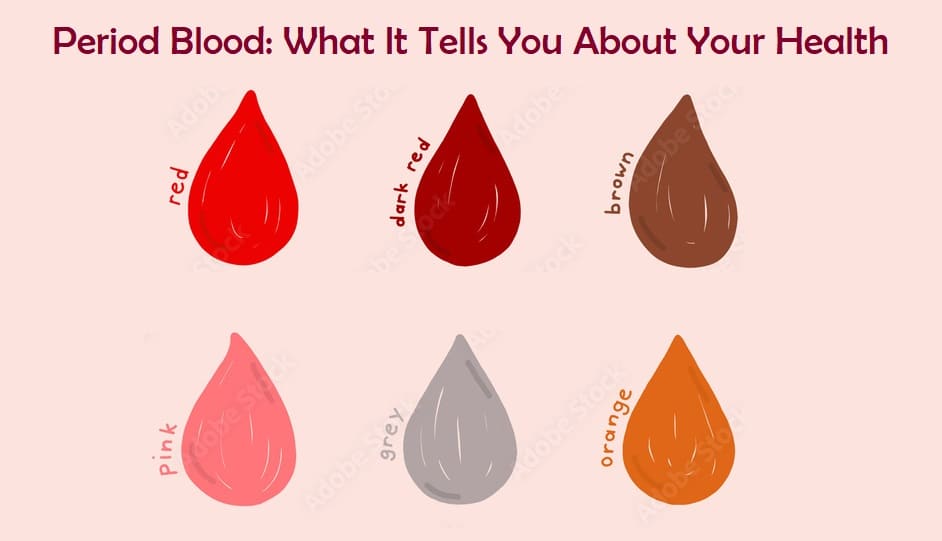Let’s be real: periods can be a hassle. But did you know that your menstrual blood can provide important insights about your health? Instead of treating it as just a monthly nuisance, consider it a valuable tool for understanding your body better. Here’s a closer look at what different aspects of your period blood can reveal and why you shouldn’t ignore these signals.
What Period Blood Tells You About Your Health: Don’t Ignore These Health Signs
1. Color Matters
The color of your period blood isn’t just a random occurrence—it can give you clues about what’s happening in your body. The color of period blood can vary throughout your cycle. Here’s what different shades might indicate:
- Bright Red: This typically means fresh blood, often seen at the beginning of your period. It’s usually a good sign that your uterus is shedding its lining effectively.
- Dark Red or Maroon: Blood that appears darker may be older and indicates that it’s taken longer to leave the uterus. This can be normal, especially toward the end of your period.
- Brown: If your blood looks brown, don’t panic! It often means that the blood is older and has taken time to exit your body. However, if you notice brown discharge between periods, it may be worth discussing with a healthcare provider.
- Bright Pink: This could indicate low estrogen levels, which might occur at the start of your cycle or during ovulation. If this persists, consider consulting a professional.
- Grayish or Watery: If your blood appears gray or watery, it may indicate an infection or other medical condition. Seek medical advice promptly.
2. Consistency Counts
The consistency of your menstrual blood can also reveal important health information:
- Thick and Clotty: Clots can be common, especially during heavy days, but if they’re large or you’re experiencing an unusually heavy flow, it could point to issues like fibroids or endometriosis.
- Thin or Watery: This might occur during lighter days and can indicate hormonal fluctuations. If you’re experiencing other irregularities, it’s worth consulting with a healthcare professional.
3. Flow Strength
How heavy your flow is can be a significant indicator of your reproductive health:
- Heavy Flow: Soaking through pads or tampons every hour or passing large clots isn’t something to ignore. It could indicate underlying issues like fibroids or hormonal imbalances.
- Light Flow: A consistently light flow might be a sign of hormonal issues or conditions like polycystic ovary syndrome (PCOS). If this is a sudden change, it’s a good idea to chat with your doctor.
4. Odor Awareness
Believe it or not, the smell of your period blood can also provide clues about your health:
- Mild or No Odor: This is normal. But if you notice a strong or foul smell, it could indicate an infection or other health concerns. Keep an eye out for any itching or unusual discharge.
5. Duration of Your Period
How long your period lasts can tell you a lot about your health:
- Normal Duration: Most periods last between 3 to 7 days. If yours is consistently longer or shorter, it could indicate hormonal imbalances or other issues.
- Irregular Cycles: If your periods are often irregular, it’s worth discussing with your healthcare provider to rule out conditions like PCOS or other hormonal disorders.
When to Seek Help?
While keeping an eye on your period blood can be insightful, there are times when you should definitely reach out for professional advice:
- Significant changes in flow, color, or consistency
- Severe pain that interferes with your daily life
- Periods lasting longer than 7 days or cycles that are consistently short
- Unusual odors or discharge that don’t seem normal
- Sudden changes in your cycle after years of regularity
Conclusion:
Your period blood is more than just a monthly inconvenience; it’s a valuable window into your overall health. By paying attention to its color, consistency, flow, odor, and duration, you can gain important insights into your body’s signals. Remember, you know your body best—if something feels off, don’t hesitate to reach out to a healthcare professional. Taking charge of your health starts with understanding and listening to your body!
Also Read:
